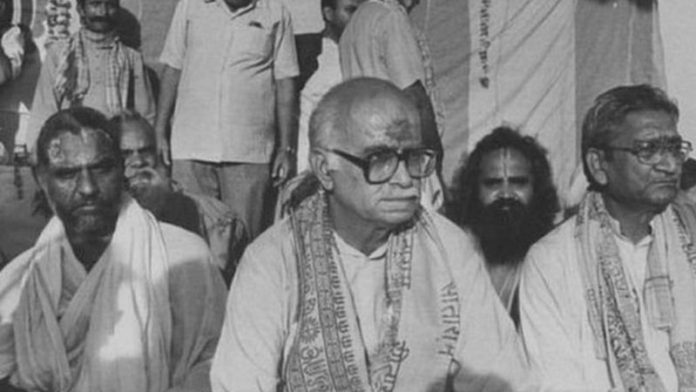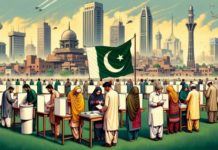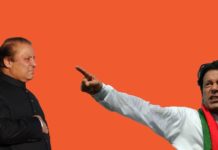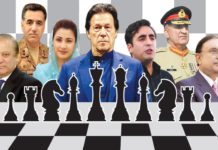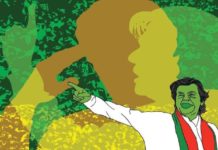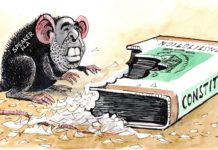A special court in Lucknow, India has acquitted all the 32 accused named in the Babri Mosque demolition case.
Special Court Judge SK Yadav said in his judgment that the demolition of Babri Mosque 28 years ago was not done under any formal plan so all the accused are acquitted.
The special court judge further said that there was no concrete evidence of involvement of the named accused in the case. It may be recalled that almost 28 years after the demolition of Babri Mosque, the verdict in this case has been announced today.
According to the law, all the 32 accused named in the case were ordered to be present in the court when the court pronounced its verdict in the case. Some accused owing to their age, attended the verdict via video link.
The accused in the case included several senior politicians, including co-founder of the ruling Bharatiya Janata Party (BJP) and former deputy Prime Minister LK Advani, former Union ministers Murli Manohar Joshi, Uma Bharti and former Uttar Pradesh chief minister Kalyan Singh. Two cases of Ayodhya’s historic Babri Masjid were pending in the court.
One case was of land ownership, which the Supreme Court ruled in November last year that the land where the Babri Mosque was located was temple land. At the same place, two months ago, Prime Minister Narendra Modi laid the foundation stone of the Ram Temple in a grand ceremony.
The second case is the demolition of the Babri Mosque. On December 6, 1992, the Babri Mosque was demolished by a large mob. The mosque was built 500 years ago during the reign of India’s first Mughal emperor, Zahiruddin Babar. Hindu Karsioks believe that this mosque was built on the birthplace of their god Ram Chandra.
After the demolition of Babri Mosque, the Ayodhya administration had registered two cases.
One was against thousands of unidentified Hindu volunteers who attacked the mosque and the other was about a conspiracy to demolish it. In this case, LK Advani, Joshi, Uma Bharti, Sadhvi Rathambra and many leaders of Vishwa Hindu Parishad and many other people of Ayodhya were accused.
Initially, 48 people were charged. 16 suspects have also died during the three-decade-long trial.
The two cases of demolition of Babri Mosque were first tried in two courts of Rai Bareli and Lucknow but were later merged on the order of the Supreme Court and their hearing was completed in the Sessions and District Court of Lucknow. There was a stage during the investigation and trial when the Bureau of Investigation withdrew the conspiracy case against Advani, Joshi and other senior leaders but later reinstated it after the intervention of the High Court and the Supreme Court.
The CBI’s argument against the accused in the case is that they conspired to demolish the 500-year-old Babri Mosque and incited Hindu Karsioks to demolish the mosque. Defendants argue in their defense that they have no evidence to prove their guilt. He also claims that the ruling Congress government in Delhi at the time of the demolition included him in the case as political revenge.
Last November, the Supreme Court ruled in favor of the Hindu side in the final decision on the ownership of the Babri Mosque land, but it was observed that the demolition of the Babri Mosque was a criminal act.
In the past, no one was usually punished for such acts of violence and sabotage by such mobs. An important aspect of today’s decision is whether the court believes that a conspiracy was hatched to demolish the Babri Mosque and whether Advani and his associates were responsible for the conspiracy.
The verdict in this case will not affect Indian politics or Hindu-Muslim relations. Following the final settlement of the mosque-temple dispute last November, a Muslim party suggested that the mosque demolition case be withdrawn as an expression of reconciliation and goodwill. But since the case had reached its conclusion by then, the proposal did not gain much importance.
On December 6, 1992, millions of Hindu caravans from across the country gathered in Ayodhya. Senior BJP leader LK Advani had launched a nationwide rath yatra in association with his ideological wing, the RSS, to pave the way for public opinion to build a Ram temple at the site of the Babri Mosque.
Advani had called the Babri Mosque a “national stigma”. At that time there was a Congress government in Delhi and Narasimha Rao was the Prime Minister. Uttar Pradesh was ruled by the BJP and Kalyan Singh was the Chief Minister. He had assured the Supreme Court in an affidavit that there would be no fire at the Babri Mosque despite the presence of millions of caravans.
The central government had deployed paramilitary forces in Ayodhya and the adjoining city of Faizabad several days before December 6, amid fears of demolition.
The Babri Mosque was built on a high mound. It was surrounded by barbed wire and tin fences. Thousands of policemen guarded it. The caravans had been gathering in Ayodhya for several days. Their numbers were growing.
On December 6, hundreds of carjackers marched on the mosque with shovels and hammers, causing the police and paramilitary forces to retreat. By noon, the three domes of the Babri Masjid had been demolished. The incident was followed by riots in several states of the country in which at least 2,000 people were killed, according to official figures.
The Ram Janmabhoomi movement, led by LK Advani, for the first time gave a sense of collective nationalism to the scattered Hindu nation in India. In this democracy with more than 80% Hindu population, nationalism and India’s cultural heritage were not interpreted as a mixed heritage of different religions and were attached to the Hindu state. Thanks to this movement of Hindu revival, the popularity of the BJP increased and within six years it came to power at the Center.
India’s secular democracy gradually turned into a Hindu-leaning democracy. When Advani was the Deputy Prime Minister, Narendra Modi was the Chief Minister of Gujarat. He was considered Modi’s political guru. Advani was the one who defended Modi at the time when he was facing criticism from Prime Minister Atal Bihari Vajpayee over the Gujarat riots and he stood by Modi at every stage.
But Modi’s deep differences with Advani may have been because Advani termed Pakistan’s founder Muhammad Ali Jinnah a secular visionary. Prime Minister Modi has pushed the most active politician of independent India into complete isolation and anonymity.
Advani and his colleague Murli Manohar Joshi, who brought Hindu nationalism to a collective consciousness, are living in political isolation today. Narendra Modi is at the height of his popularity on the basis of the Hindu nationalism he founded. The dream of a Hindu-dominated India that Advani envisioned seems to be coming true.


